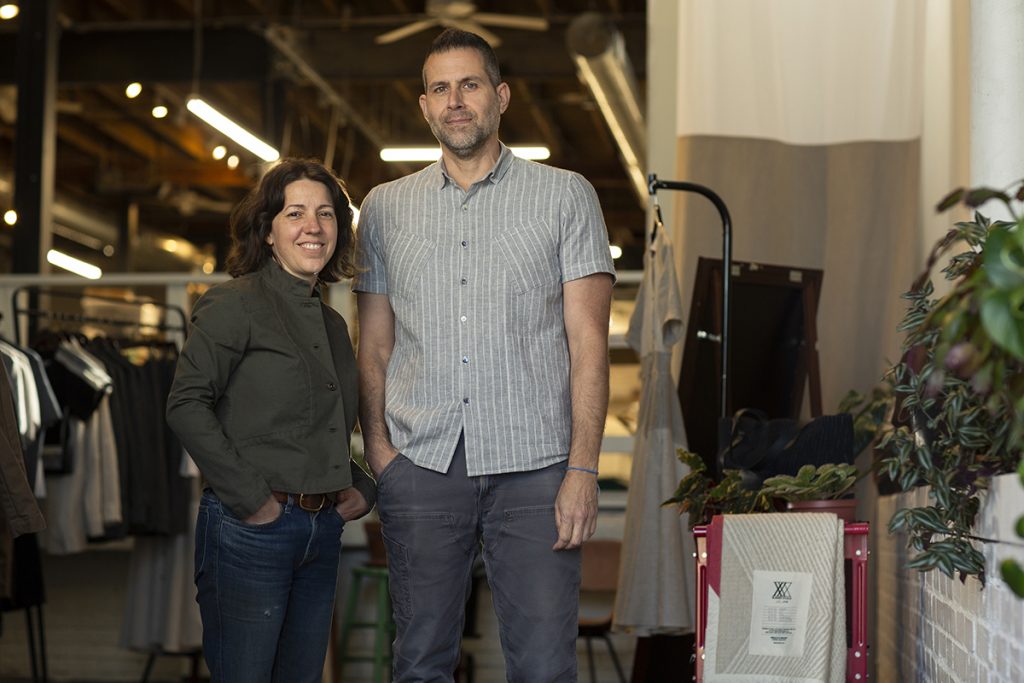
Sew Co. founder Libby O’Bryan, left, and Rite of Passage designer Giovanni Daina-Palermo.
Photo by Colby Rabon
One summer during college, Leigh Anne Hilbert worked the graveyard shift at a Hanes factory in Galax, Virginia. From seven at night to seven in the morning, she dipped cotton in vats of bleach and listened for the break alarm to sound every two hours.
“I swore I would never work in a factory again,” Hilbert tells Asheville Made from the floor of Sew Co. (pronounced “SoCo”), a cut-and-sew manufacturing facility in Asheville. “But here I am,” she laughs.
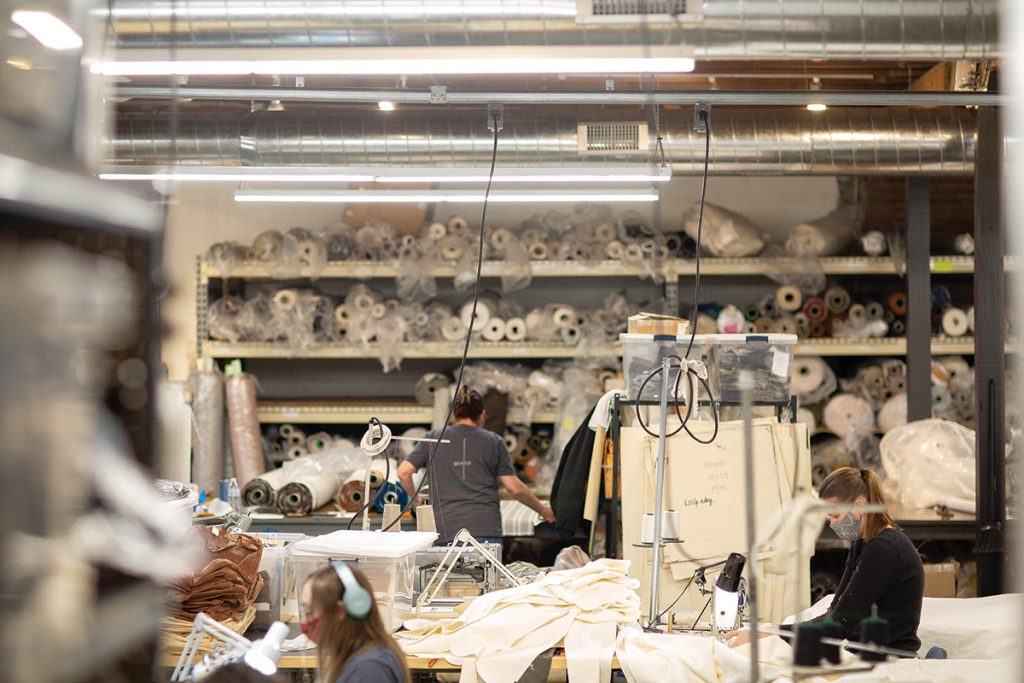
Photo by Colby Rabon
Hilbert joined Sew Co. five or six years ago — she’s admittedly bad with timelines — when founder Libby O’Bryan went on maternity leave. Back then, Sew Co. was housed in The Oriole Mill, a small-batch fabric producer in Hendersonville.
But last October, after the pandemic forced The Oriole Mill to close its doors, Sew Co. navigated a 25-mile transition to the River Arts District. The manufacturer is now located at 240 Clingman Avenue Extension, between Odyssey ClayWorks and Ultra Coffeebar.
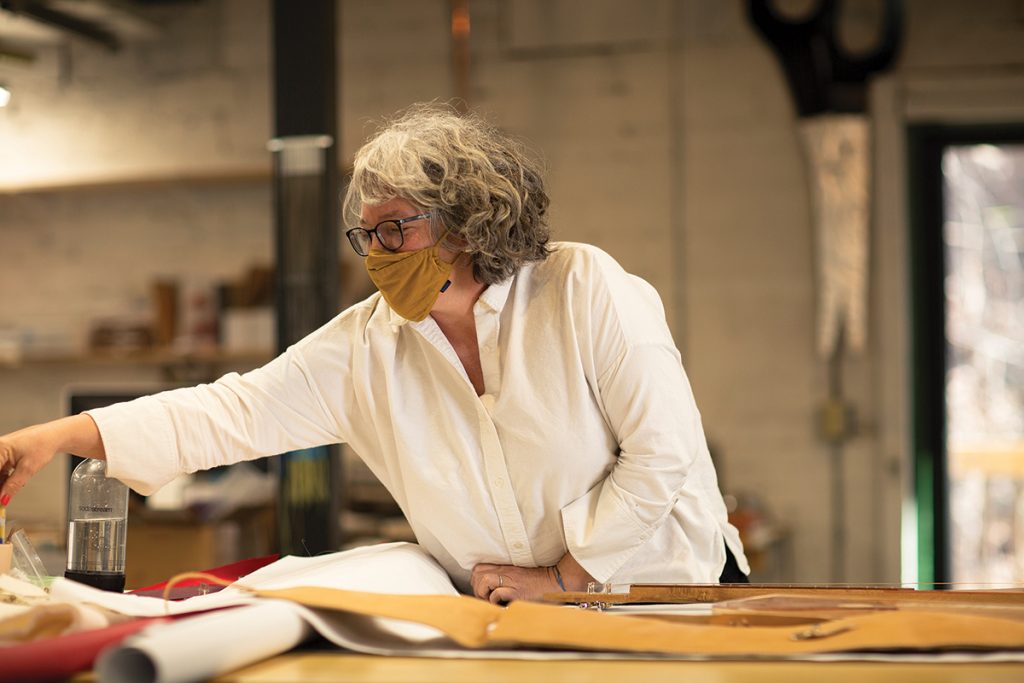
Photo by Colby Rabon
Though the move was motivated by necessity, it also felt like a homecoming, says Hilbert. That’s because well before the RAD emerged as a haven for creatives, it was Factory Hill: an industrial hub that produced everything from ice to denim to flour.
Factory Hill boomed between the 1880s, when the Norfolk Southern railroad expanded to the banks of the French Broad River, and the 1930s. But after the Great Depression, production slowed. Then, in the late 20th century, textile tycoons began exporting jobs overseas. The domestic fabric trade fell to the powers of globalization and entire cities struggled to stay afloat.
“When the mill shut down, everything around it shut down, too,” Hilbert says of Fries, her hometown in Virginia. The heart of Grayson County — a yarn mill — ceased production in 1989. “Even the high school closed,” says Hilbert.
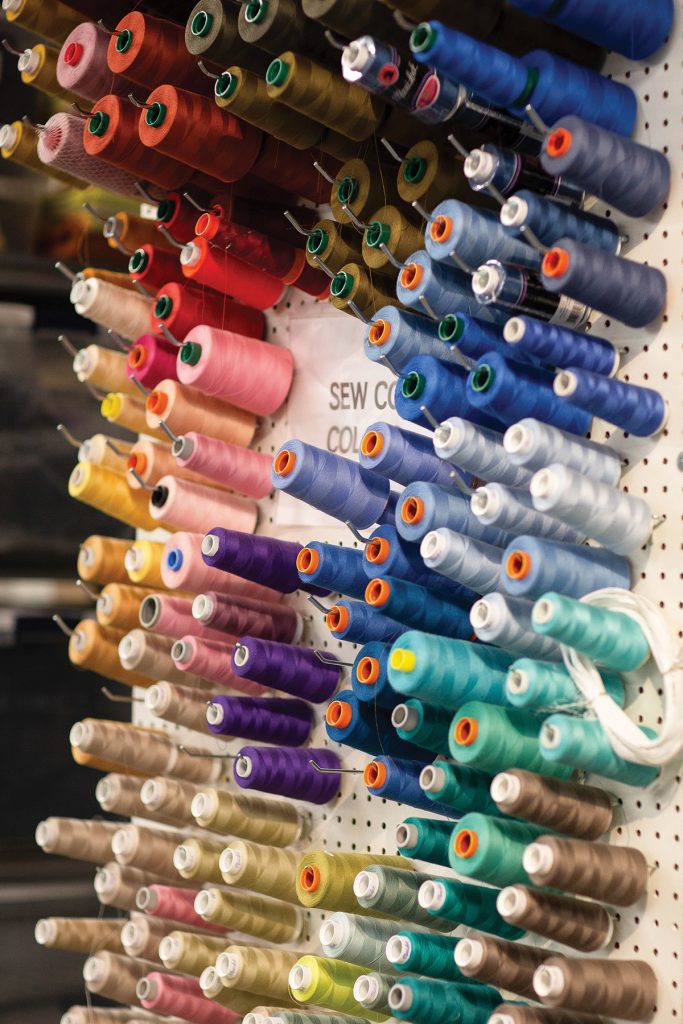
In the early 2000s, O’Bryan was also witnessing the effects of job outsourcing. While working for fashion-industry clients in New York City and Chicago, she watched countless factories go belly up.
“This labor force was not being valued in our domestic manufacturing economy,” says O’Bryan. “I knew these skills weren’t going to survive if we didn’t nurture them.”
O’Bryan began exploring what it would take to establish a small production facility. The Oriole Mill was operating on a “small scale, boutique-like manufacturing model,” and after a few long-distance conversations, Sew Co. launched in the mill’s 72,000-square-foot warehouse in 2010.
Though O’Bryan describes the company’s time in Hendersonville as “just phenomenal,” she always had her sights set on Asheville. “I saw Asheville as this creative, vibrant arts community with a rich history of craft and a real reverence for skill,” she says.
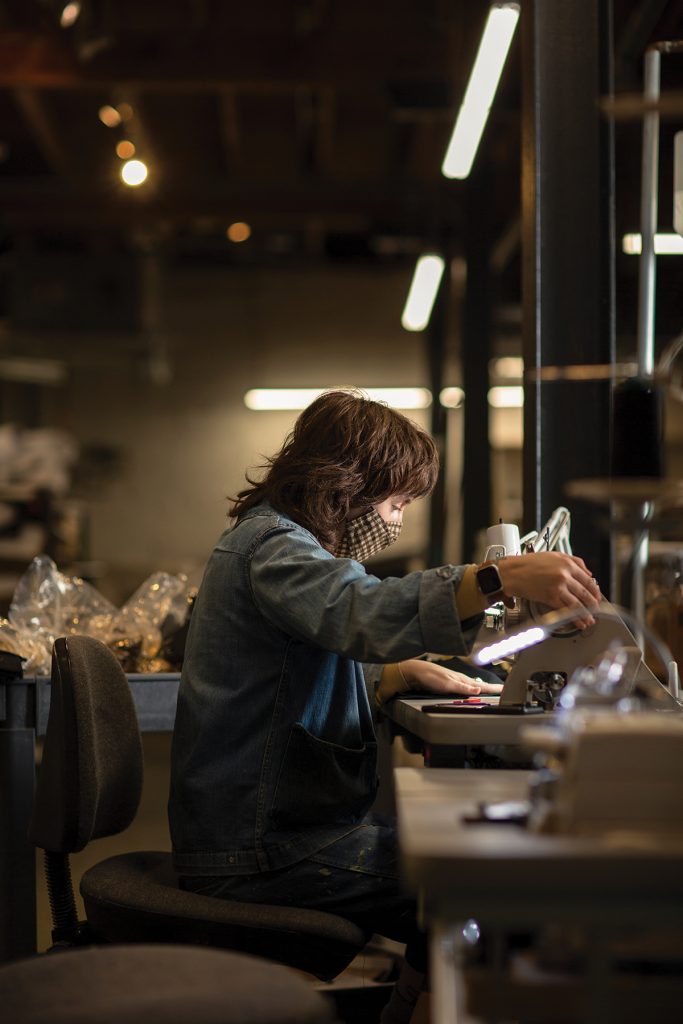
Plus, as Sew Co.’s team grew, more and more staff members were commuting from Asheville. “It became a carbon-footprint issue,” says O’Bryan, noting that Sew Co. partners with a company called Material Return to recycle all textiles. “We are as zero-waste as we can be.”
So, when The Oriole Mill closed, O’Bryan felt it was time for the company to “forge its own destiny.”
In summer 2021, renovation of the 7,500-square-foot site on Clingman began. Gallery walls were knocked down and new lights were installed to create a bright, airy manufacturing floor. Besides doing production sewing for established artisan companies such as Milk & Honey (outdoor kids’ clothing) and Quiet Town (bath accessories), Sew Co. also offers design-development and material-resourcing services for aspiring makers.
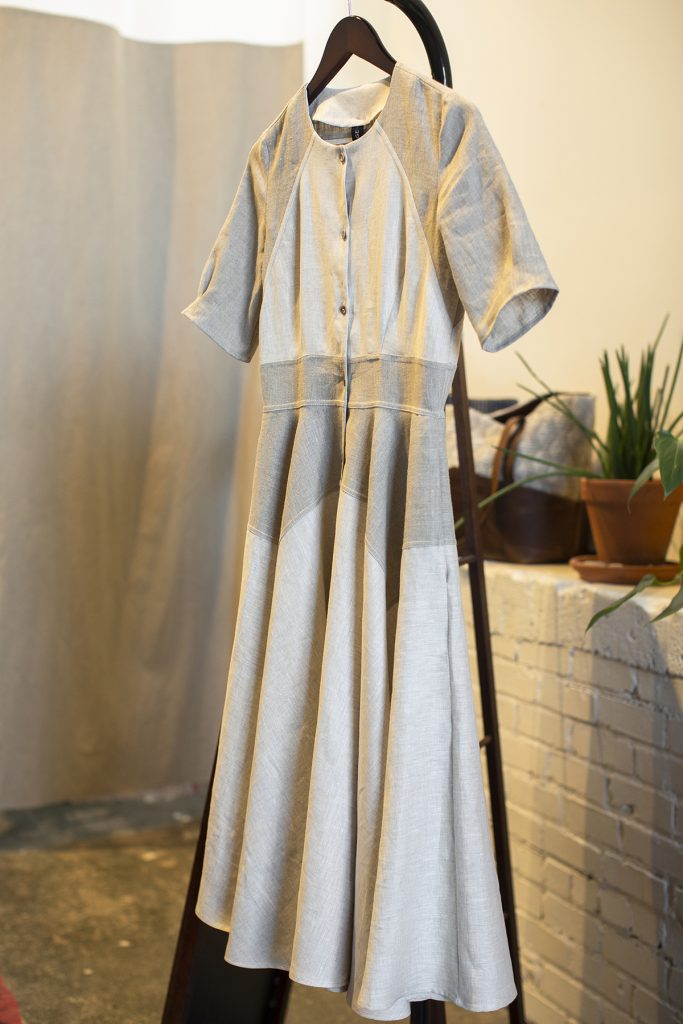
And what was once the building’s truck well was reimagined into a retail space for Sew Co.’s own brand of women’s wear, Rite of Passage.
The brainchild of O’Bryan and fashion designer Giovanni Daina-Palermo, Rite of Passage is inspired by forms and lines in nature. It’s also inspired by the art of connecting consumers to makers.
“Rite of Passage isn’t just about being introduced to another clothing brand,” says Daina-Palermo. “It’s about educating customers and having conversations about where the clothing is made, how it’s made, and who is making it.”
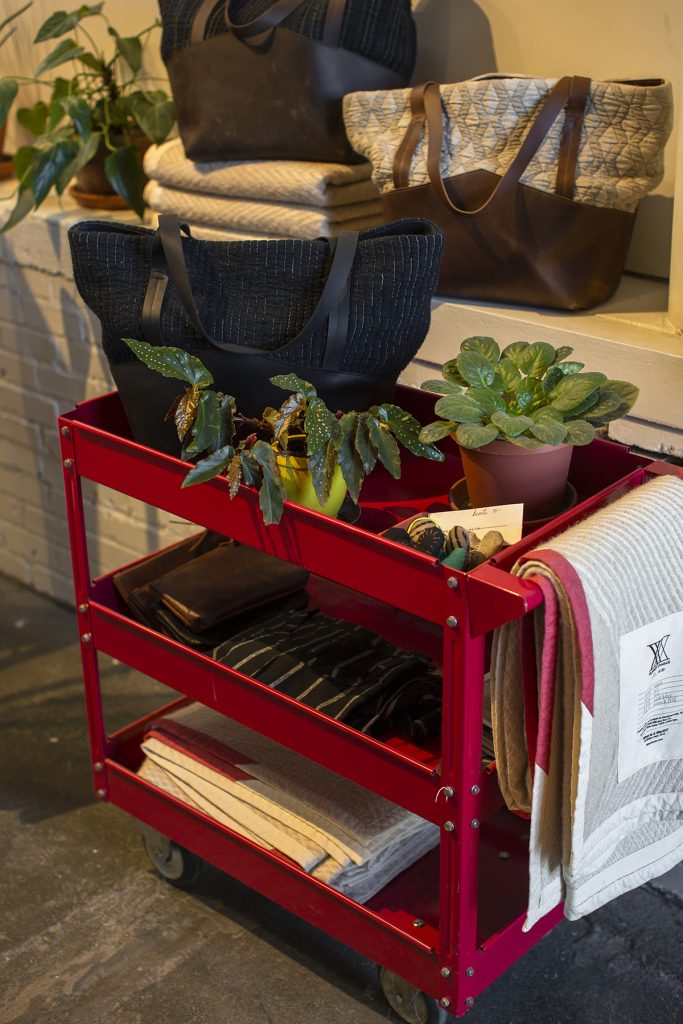
Taking notes from open-kitchen concepts, the facility’s brick-and-mortar storefront has been designed so that shoppers can look into the manufacturing space. The team at Sew Co. is small and intimate compared to the textile mills of yesteryear. In the late 1800s, for instance, The Asheville Cotton Mill on Riverside Drive employed well over 300 people. The 20 employees of Sew Co. earn a living wage, work in ethical conditions, and are privy to the company’s profit-and-loss statements. There’s also a different ambiance on the factory floor.
“There’s music and chatting,” says Hilbert, “and more of a community feeling than I have ever experienced in a factory.”
Sew Co., 240 Clingman Ave. Ext., Asheville. The Rite of Passage retail space is open Monday to Saturday, 10am-6pm. For more information, visit wcsewco.com.